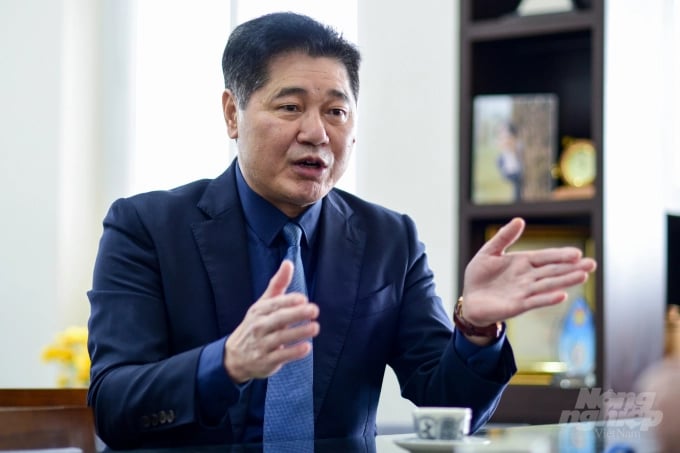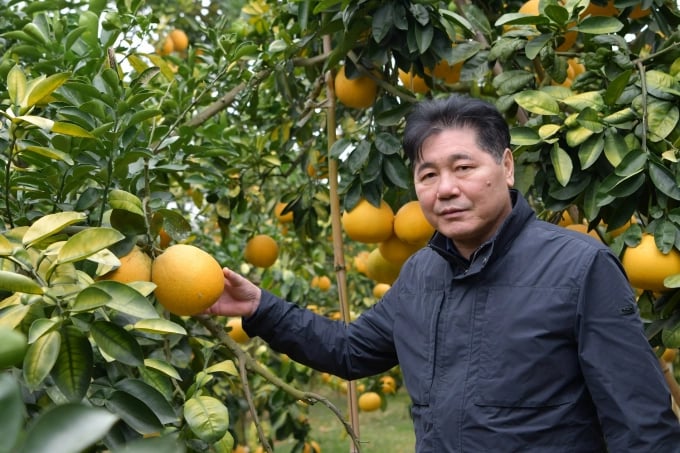May 25, 2025 | 14:45 GMT +7
May 25, 2025 | 14:45 GMT +7
Hotline: 0913.378.918
May 25, 2025 | 14:45 GMT +7
Hotline: 0913.378.918
Vietnam's agriculture is moving from agriculture that aims to maximize quantity to one that prioritizes quality and efficiency. If it was in the past, farmers would plant fruit trees, the fruit had to be as big as possible, and rice should give maximum yield. Putting productivity goals on the top caused production decisions and investment rates to become unscientific, wasteful, effective and low profit. But now, when fertilizer prices are very high and investment is overbearing, even inorganic fertilizers are used excessively just to gain higher productivity, sometimes the final results still lead to zero profit. Therefore, in order to decide how to produce appropriately, there requires a need to converge and analyze many factors, and choose which production procedure is the most optimal.

Mr. Le Quoc Thanh, Director of the National Agricultural Extension Center. Photo: Tung Dinh.
Not all producers at the present date apply correct cultivation procedures as many of which are applied to a large area, meaning that they are not suitable for every field. Without adjustment plus reasonable and scientific application, inputs can easily result in waste.
Inputs are the raw materials for outputs. It is not possible to create a quality product when the raw materials are not guaranteed. And if the producer uses those materials economically and reasonably, the final products will both ensure optimal productivity and quality while having the lowest cost but highest competitiveness and profit.

Unscientific use of inputs causing waste of inputs in production is still very common. Photo: LHV.
Agricultural extension activities are currently making an effort in eliminating the gap and inadequacy between scientific and technological procedures and solutions as well as production practices.
However this feat cannot be done overnight. The National Agricultural Extension Center (NAEC) has identified and developed new approaches to implement its actions. Training courses, information and communication activities, science and technology transfer are all aimed at solving the problems posed by present production practices.
Vietnam's agriculture is rapidly shifting toward the organic and circular direction which are considered the right path to help lower investment costs, produce more safe products, and develop sustainably.
But in the new context, circular agriculture will have to be more comprehensive and associated with scientific and technological solutions. The key to making good use of circular agriculture is still traced back to science and technology.
To give an example, if one wants to take advantage of by-products such as fertilizer to serve production, advanced solutions and procedures are required. Just having a simple thought that all by-products can be used as fertilizer is not entirely accurate because there are many types of by-products, even some that carry heavy metals or fungi that easily become hosts for various diseases.

Many circular and organic agriculture models have been effectively deployed by NAEC in many provinces and cities across the country. Photo: Trung Quan.
As for organic agriculture, the first thing to consider is that there must be organic inputs (environment, soil, materials). Organic agriculture, in order to further develop, needs a "tractor" for the product consumption market. The development of the market for organic agro-products must actually be one step ahead.
Demanding a development in the organic agricultural market means demanding organic product transparency. This calls for organic certifications. And to acquire this certification the products must meet the world’s strict requirements, standards and regulations.

Mr. Le Quoc Thanh during a visit to an organic pomelo production model in Luc Ngan (Bac Giang). Photo: Le Ben.
There was a time when the agricultural extension forces thought that the goal of input-supplying enterprises was to sell a lot of products, going their own way, and the business agricultural extension team was to do marketing and selling products. Since then they became hesitant to raise the question of cooperation with the intention of encouraging farmers to use inputs sparingly.
But contrary to speculations, when the NAEC implemented public-private partnership (PPP) in agricultural extension activities, a large number of businesses became interested and participated. This was a surprise exceeding expectations, and also a good sign that businesses had changed their business mindset towards more sustainable development by caring about producers.
Bringing state agricultural extension activities and enterprise agricultural extension activities together was thus the right call. The PPP program opened up many opportunities for state management agencies, businesses and farmers, creating huge resources for the development of agriculture.
Translated by Samuel Pham

(VAN) The mutual export of agrifood products between the European Union (EU) and the United Kingdom (UK) must occur again without certification, border controls or other red tape. This was agreed at the UK-EU summit.
/2025/05/22/5121-2-173645_677.jpg)
(VAN) NBSAP Tracker identifies strengths and areas for improvement in the National Biodiversity Strategy, based on each region’s priorities and capacities.

(VAN) The draft amendment to the Circular on rice export trading stipulates a periodic reporting regime for rice exporting enterprises.

(VAN) Dong Thap farmers attained an average profit margin of 64% during the summer-autumn 2024 crop (first season), while An Giang and Kien Giang farmers followed with 56% and 54%, respectively.

(VAN) As a doctoral student doing research on renewable energy and electrification at Harvard University, the author shares his musings on electricity, nature, and countryside memories.

(VAN) The decree on Extended Producer Responsibility (EPR) ensures transparent management and disbursement of support funds, avoiding the creation of a “give-and-take” mechanism.

(VAN) Hue City rigorously enforces regulations regarding marine fishing and resource exploitation, with a particular emphasis on the monitoring of fishing vessels to prevent illegal, unreported, and unregulated (IUU) fishing.